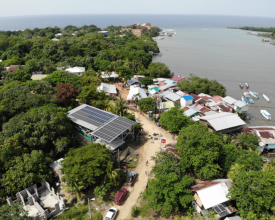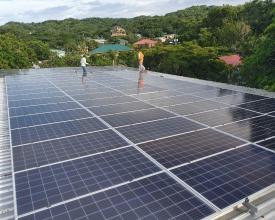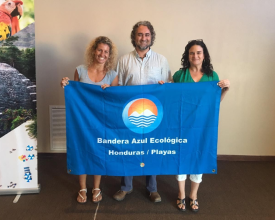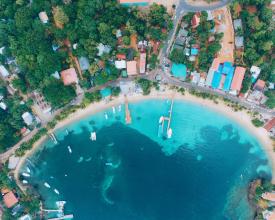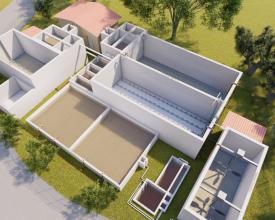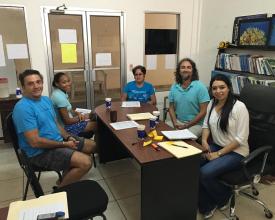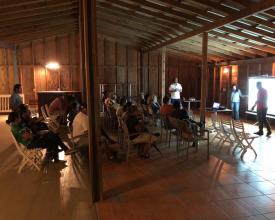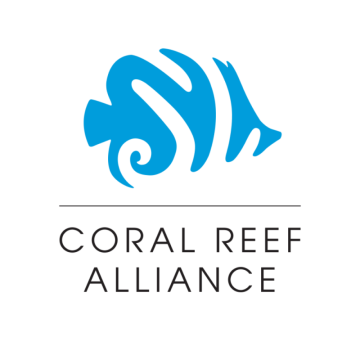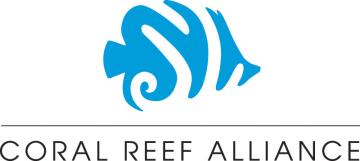
Ensuring the Sustainability of Wastewater Operations in West End, Roatán.
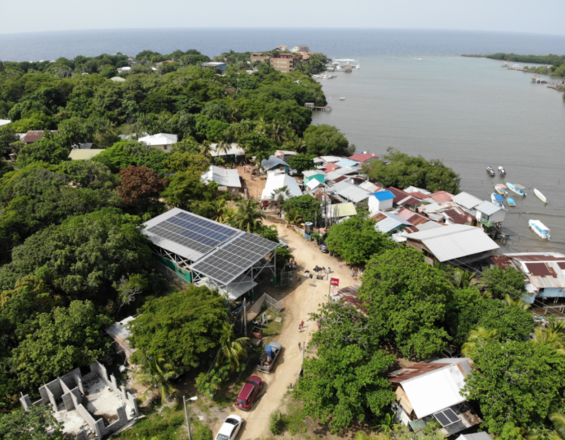
The community of West End, Roatán, is located in the Mesoamerican Reef and is one of the hubs for the tourism industry that is essential to the Honduran economy. Over a million tourists visit the island of Roatán in the Bay Islands each year, drawn to its colorful reefs, white-sand beaches, and clear waters.
To ensure the protection of the Roatan reefscape, The Coral Reef Alliance (CORAL) has been leading efforts to improve marine water quality in Honduras since 2012, the same year when the community of West End had its activated sludge wastewater treatment plant (WWTP) built. The plant is currently managed and operated by Polo’s Water Board with support from CORAL and the Mesoamerican Reef Fund (MARFUND). Unfortunately, the COVID-19 pandemic created a significant loss of operating revenue for the plant due to Roatán's tourism-dependent economy.
Context
Challenges addressed
-
Inefficient wastewater management leading to poor water quality and its impact on the integrity and health of both humans and corals; as well as the local tourism industry.
-
Roatán’s economy is highly dependent on tourism. Additionally, many of the residences in the West End community are vacation homes. Unfortunately, as COVID-19 began to ramp up, many people with vacation homes returned to their home countries. The hotels emptied out and, although borders are now open, tourism is recovering very slowly and will most likely not recover fully until the last quarter of 2021.
-
Because the wastewater plant depends entirely on user fees to operate, Polo’s Water Association is now facing a 70% reduction in its operative income.
Location
Process
Summary of the process
Multi-stakeholder and Community Engagement promotes governance and allows the project to reach its infrastructure goals and financial goals through payment of service fees and additional funding through grants, providing input for Budget Modeling for Sustainable Financing which assesses the project's finances, identifying projected cash flow, needs, and funding opportunities; while promoting resilience through designing budget scenarios. Marine Water Quality Monitoring generates data to evaluate its performance and to design its potential growth.
These first building blocks provide the elements that go into planning for the Future. The improvements are established with a holistic approach that unifies scientific, technical, and financial factors; as well as honoring its community-based management model.
This management model has the potential to be adapted and replicated in communities of the Bay Islands of Honduras and also in marine-coastal areas within the Mesoamerican Reef and Small Island Developing States (SIDS) based on their shared geographical characteristics and challenges.
Building Blocks
Marine Water Quality Monitoring
The partnership between Polo’s Water Board, CORAL, and the Bay Islands Conservation Association (BICA - Roatán) has strengthened local marine water quality monitoring efforts.
The partnership created a win-win collaboration where BICA can learn more about the connection between their control sites and the impact of wastewater infrastructure; while Polo's Water Board can have access to data that helps them assess the plant’s performance and CORAL can also access valuable data and information to continue promoting clean water for reefs.
Enabling factors
-
Support of water quality monitoring programs.
-
Empowerment of the local laboratory.
-
Development of a comprehensive water quality database.
Lesson learned
-
Water quality monitoring has created an opportunity to create data and information that, when strategically shared, can be fundamental to motivate and enhance collaboration between public and private stakeholders, securing investment in sanitation infrastructure and promoting marine conservation initiatives.
-
Collaboration to find a balance between community development and environmental conservation.
Budget Modeling for Sustainable financing
Budget modeling has been incorporated into the plant’s management model. With CORAL’s support, Polo’s Water Board has been able to design its annual budget based on different economic scenarios that range from the financial needs to ensure operations remain at full capacity to budgeting based on austerity measures due to reduced revenue.
Coral and Polo's Water Board are also collaborating on creating a strategy to diversify income sources by engaging with new partners and donors and the potential commercialization of the treatment process (sludge composting).
Enabling factors
-
CORAL’s commitment to supporting sanitation best practices and its expertise in guiding sustainable financing initiatives for non-profits and community organizations.
-
Establishment of a flexible funding model that allows partners to apply to additional funding during the execution of a grant and scheduling deliverables based on realistic and sustainable timeframes.
Lesson learned
- If possible, plant operators should work on annual cash flow and financial needs projections to identify potential shortcomings or to plan their growth.
- It's important to identify and invest in technologies that can offer a high degree of efficiency. This will reduce the cost of maintenance and the need to reinvest in high-cost replacements. It is also important to ensure that more commercial/easy to access brands & technologies are considered to facilitate reparations.
- It is essential for operators and communities to have access to funding that will allow them to acquire complementary equipment to increase the effectiveness of sanitation and wastewater treatment plants. West End's Waterboard fundraised to buy a small truck to facilitate mobilization of field staff, carrying supplies, tools and reduce transportation costs.
Multi-stakeholder and Community Engagement
This integrated and highly participatory approach has been fundamental to ensure the success of the WWTP. The Polo's Water Board collaborated with CORAL, The West End Patronato (Community board), and the Roatán Municipality to gain support and cooperation from the local community; which was essential to ensure the connection of residences and businesses.
The community was also involved in the establishment of a fee, a process developed by Polo's under the guidance from the Ente Regulador de los Servicios de Agua y Saneamiento (ERSAPS), which is the federal government entity responsible for regulating water and sanitation providers.
It has allowed us to secure funding, build strong partnerships, and most importantly gain the community’s support and trust by creating a positive change in their environment and creating job opportunities.
Enabling factors
-
Empowering the community of West end through local capacity building on technical and management skills.
-
Multi-Stakeholder engagement focused on both the public and private sectors, allowing CORAL to establish strong partnerships that positively impacted gaining the support of cooperation agencies, donors, and policymakers
Lesson learned
- Multistakeholder collaboration, community engagement, transparency, capacity building, and empowerment of staff are essential to ensure the efficient management and operation of the plant.
- Promoting sanitation best practices at a community level is a long-term process that requires trust and collaboration. Even though it's been challenging, CORAL successfully included the West End Community and its young female professionals in the water and sanitation value chain.
Planning for the Future
In 2020, CORAL and the Polo’s Water Board commissioned a third-party consultant to assess the WWTP's performance and necessary improvements. Identifying improvement areas to achieve continued compliance with high water quality standards and a wastewater treatment capacity for the projected population growth of the greater West End area and its tourism industry until the year 2040.
The result is an investment gap of approximately USD 300,000.00. However, phased investment is considered in the fundraising strategy.
Projected Investments (currently in fundraising stage)
By 2022: Replacements in the aeration system, going from aerator pumps to a fine bubble diffuser system.
By 2030: Addition of a new anoxic tank for denitrification.
By 2040: Addition of a new decanter and mechanical sludge dehydrator.
The projection for 2040 is based on population growth/requirements as a tourist destination/compliance with national & international water quality regulations). The estimated average daily flow will be 612 m3/day.
Enabling factors
- Polo's Water Board has established strong partnerships with organizations such as CORAL and MARFund, which have collaborated by funding previous repairs and improvements.
- These multistakeholder alliances for sanitation and wastewater treatment can open the door for new partners and provide access to diverse funding opportunities.
- Non-profits and local organizations are gaining more experience in diversifying funding sources.
Lesson learned
- It is critical to conduct third-party assessments to identify the status of the infrastructure, improvement areas, and the need for future investments.
- Communities and plant operators should not be discouraged by the scale of their wastewater treatment investment needs. These mark the way forward towards successful management and the continued improvement of the project.
- Creating and maintaining strong alliances are pivotal to find solutions for technical and financial needs.
Impacts
-
The alliance between Polo’s Water Board CORAL transformed wastewater management in the community of West End. Setting a standard for effective wastewater treatment based on community management; bringing the cumulative amount of raw sewage treated to an incredible 29.3 million gallons per year.
-
In 2020 Polo’s waterboard was able to cover electrical costs, reparation of the aeration system, additional roofing, 62 solar panels to reduce monthly costs and daytime energy consumption by 80%, and a new station to increase coverage of sewage treatment services.
-
There has been a significant improvement in the marine water quality since the WWTP's construction. A clear example is the certification of Half Moon Bay beach under the Ecological Blue Flag Program.
Beneficiaries
-
Local community.
-
Tourism stakeholders.
-
Co-managers of the Bay Islands National Marine Park.
-
Marine and coastal communities and Small Island Developing States that might replicate this project.
Sustainable Development Goals
Story
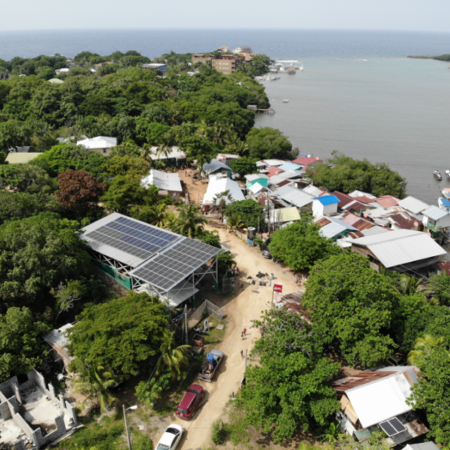
West End Roatán and its Half Moon Bay beach offer its local population and visitors beautiful, clean, blue, and safe marine water that can also protect the reef's health while supporting its journey towards becoming a sustainable tourism destination.
The partnership between The Coral Reef Alliance and Polo’s Water Board has resulted in the effective management of wastewater treatment in West End, preventing marine pollution by treating 29.3 million gallons of raw sewage per year.
